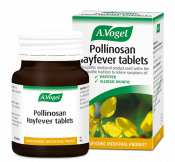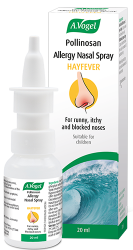Allergic rhinitis and inflammation
In someone with allergic rhinitis, the immune system releases histamine when it comes into contact with allergens such as pollen and mould spores. This increases blood flow to the affected areas and is, ultimately, an attempt to push out these allergens or stop them from entering the body in the first place. However, the chemical histamine causes many problems for the body including itching, irritation, swelling and inflammation.
Inflammation can occur in the nasal passages thus leading to congestion. However, it also regularly occurs on the lips and around the eyes as well so it is the most visible symptom of the condition.
What can you do?
When allergic rhinitis causes you to suffer from inflammation it can be frustrating and uncomfortable. Fortunately though, there are a few steps you can take to try and reduce the severity of the problem.
Anti-inflammatory foods
Your diet can give you back some control over inflammation and allergic rhinitis. That’s because there are a variety of anti-inflammatory foods which should ease the problem a little including:
- Berries – blueberries, blackberries, blackcurrants
- Root vegetables – carrots, sweet potatoes, butternut squash, pumpkin
- Fish – sardines, salmon, pilchards, herring
- Fruit – plums, pineapples, grapes, pears, papaya
- Other – raisins, prunes, flaxseed oil, pumpkinseed oil, figs, avocadoes.
Histamine
There are many food and drinks that are high in histamine and so they have the potential to make your allergic rhinitis symptoms worse. These include:
- Alcohol
- Caffeine
- Milk-based products
- Smoked meats
- Foods with artificial colourings
- Walnuts
- Cashew nuts
As an alternative, you should opt for foods low in histamine including:
- Fresh fruit and vegetables
- Fresh meat and fish
- Herbal teas
- Eggs
- Rice
Echinacea
The immune system is put under a lot of strain when dealing with allergic rhinitis and so it may prove beneficial to take some Echinacea at this time as this supports the immune system.
Nettle tea
Nettle plants have natural anti-inflammatory properties which could improve inflammation in the nose and around the eyes and mouth. Therefore, to help ease your symptoms, all you have to do is swap your usual brew for a cup of refreshing nettle tea!
Vitamin C
Vitamin C is a natural anti-histamine meaning it could help to reduce the effects of this chemical. To gain the benefits of this vitamin you could opt for a natural vitamin C supplement or you could include lots of the following foods in your diet as these are high in vitamin C:
- Broccoli
- Citrus fruits
- Potatoes
- Red and green peppers
- Strawberries
- Pineapple
- Mango
- Kiwi
How to avoid allergens
Avoiding allergens will help to improve inflammation but needless to say this is a difficult task. Therefore, to help you out here are some tips on how to avoid a few common allergens.
Animal dander - if you have pets it’s a good idea to create a pet-free zone within your home. Your bedroom is ideal because you spend a lot of time here at night.
Dust mites - these like to hide it your bedding so keep your sheets clean and, if you can, invest in allergy-proof bedding.
Mould spores – if this causes you issues make sure to address any sources of dampness quickly and effectively. It’s also a good idea to open your windows regularly in order to circulate fresh air.
Pollen – the best way to avoid this is to stay indoors when pollen counts are high. You can use a local pollen count to keep track of the levels in your area.
Herbal remedies
Our best herbal remedy for allergic rhinitis is Pollinosan Hayfever Tablets.
These are made from seven tropical herbs and address a wide range of symptoms including congestion, sneezing, itchy eyes and inflammation. They are non-drowsy and can even be used alongside other conventional allergic rhinitis treatments should you already be on one of them.
For other issues associated with inflammation, such as congestion, you may wish to try our Sinuforce Nasal Spray. This contains menthol and works to reduce swelling in the mucous membranes, without damaging their natural, protective function.
Conventional treatments
A doctor may prescribe corticosteroids for long-term inflammation as this helps to reduce swelling. Alternatively, a doctor may opt to give you antihistamines as these tablets block the release of histamine which should, in turn, ease problems caused by the release of this chemical such as inflammation.





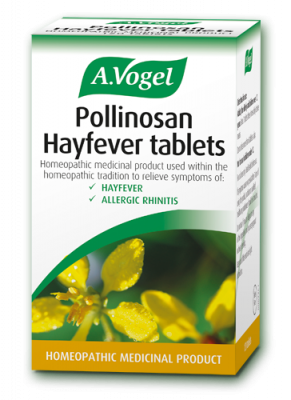
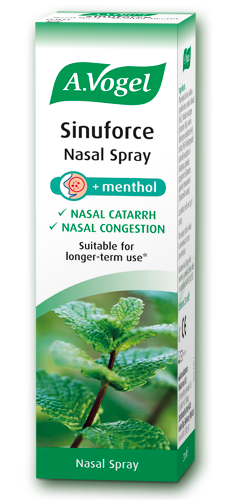
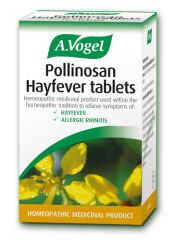 Looking for a solution to curb those hayfever symptoms such as itchy eyes, constant sneezing and congestion, then look no further than A.Vogel’s Pollinosan Hayfever tablets.
Looking for a solution to curb those hayfever symptoms such as itchy eyes, constant sneezing and congestion, then look no further than A.Vogel’s Pollinosan Hayfever tablets.
